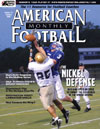AMERICAN FOOTBALL MONTHLY THE #1 RESOURCE FOR FOOTBALL COACHES
Article CategoriesAFM Magazine
|
Q & A with Mickey Andrewsby: Mike KucharSenior Writer, American Football Monthly © More from this issue For twenty-four years, Mickey Andrews has been coordinating the Florida State University defense. His longevity in such a competitive field and his commitment to stay in one place in such a transitory occupation where most other coaches are looking for the “next best thing” speaks volumes about the type of character he possesses. Now regarded as somewhat of the elder statesman in major college football, Andrews spent some time with Mike Kuchar of American Football Monthly chatting about everything from the new student athlete to the 4-3 defense. Q: Mickey, during your incredible tenure, what has been the most significant change in coaching football the last 30 years? A: I would say the biggest thing is the time restraints that the NCAA puts on you to prepare. Years ago, it seemed like you had all th....The full article can only be seen by subscribers. Subscribe today!
|
|
|||||||
| HOME |
MAGAZINE |
SUBSCRIBE | ONLINE COLUMNISTS | COACHING VIDEOS |
Copyright 2025, AmericanFootballMonthly.com
All Rights Reserved





